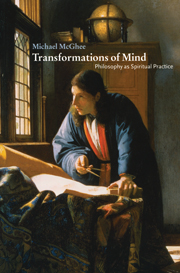Book contents
- Frontmatter
- Contents
- Acknowledgements
- Introduction
- 1 ‘A philosophy that is not a philosophy’
- 2 Contrary states
- 3 ‘… you hear the grating roar’
- 4 The energy for war
- 5 The division of the soul
- 6 ‘Wandering between two worlds …’
- 7 Kant's aesthetic ideas
- 8 … And his rational ones
- 9 Arnold's recast religion
- 10 Theism, non-theism and Haldane's Fork
- 11 Erotic reformations
- 12 A language of grasping and non-grasping
- 13 ‘… sinne/ like clouds ecclips'd my mind’
- 14 Concentration, continence and arousal
- 15 Uneasily, he retraces his steps …
- References
- Index
6 - ‘Wandering between two worlds …’
Published online by Cambridge University Press: 07 December 2009
- Frontmatter
- Contents
- Acknowledgements
- Introduction
- 1 ‘A philosophy that is not a philosophy’
- 2 Contrary states
- 3 ‘… you hear the grating roar’
- 4 The energy for war
- 5 The division of the soul
- 6 ‘Wandering between two worlds …’
- 7 Kant's aesthetic ideas
- 8 … And his rational ones
- 9 Arnold's recast religion
- 10 Theism, non-theism and Haldane's Fork
- 11 Erotic reformations
- 12 A language of grasping and non-grasping
- 13 ‘… sinne/ like clouds ecclips'd my mind’
- 14 Concentration, continence and arousal
- 15 Uneasily, he retraces his steps …
- References
- Index
Summary
The movement of Arnold's thought over the twenty years that followed Dover Beach is from the dismay and nihilism of the loss of faith to the inner call of ‘conduct’ and ‘righteousness’, the pivotal concepts of Literature and Dogma, published in 1873. Their distance from clear consciousness and presumably therefore from expression in the earlier phase determines the famous melancholy, which I suggest is the discontented voice of their insistence. As he says in The Buried Life,
Yet still, from time to time, vague and forlorn,
From the soul's subterranean depth upborne
As from an infinitely distant land,
Come airs, and floating echoes, and convey
A melancholy into all our day
This is the authentic language of an attention drowsily but desperately turning to what lies only at the periphery (or here, below the surface) of thought and volition. It is daunting, to become biographical, and sobering, that the twenty years we are talking about are the years which have been thought to have destroyed his poetry, the years as a Schools Inspector.
It is only through a long and quickened discipline of attention that what presents itself at first as ‘vague and forlorn’ etc., is going to enter forcefully into clear consciousness, thence through action into life. In Dover Beach, ‘the eternal note of sadness’ is not a consequence of the loss of faith: its sound is present even when the tide is full.
- Type
- Chapter
- Information
- Transformations of MindPhilosophy as Spiritual Practice, pp. 92 - 100Publisher: Cambridge University PressPrint publication year: 2000

